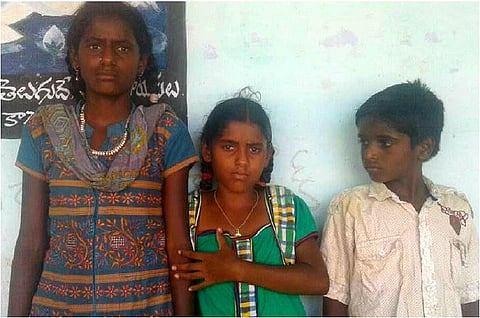

Twelve-year-old Bukya Syamulamma, a tribal girl in Kareddipalli village in Andhra Pradesh’s Anantapur district, lives all alone with her two younger siblings. A petite figure, she lugs 25 kilos of ration to and from a PDS centre located in the neighbouring village. Having lost her father to alcoholism last year, Bukya is now responsible for taking care of herself and her brother and sister.
Another 15-year-old in Kareddipalli lives by herself after her parents migrated to Kerala searching for employment. Rama Devi says that she sometimes fears for her safety.
Like Bukya and Rama, hundreds of children have been left to fend for themselves in Anantapur district. A fact-finding team comprised of ASHA, Rythu Swarajya Vedika, Human Rights Forum and AP Rythu Sangam members visited seven villages in Anantapur to assess the situation on ground and their findings paint a dismal and gloomy picture.
The report compiled on the fact-finding team’s observations explores many aspects – shortage of water for irrigation as well as consumption by humans and livestock, the lack of PDS outlets and ration cards, migration, banking and debt and so on. One of the most harrowing ordeals described in the report however, is about the children in these villages.
Migration
The district is experiencing its sixth consecutive year of drought. A majority of borewells have dried up, crop yield destroyed. Orchards that are almost a decade old haven’t been able to bear the drought either, and have dried up. Many farmers and their families have been compelled to migrate to neighbouring states looking for other means to earn a livelihood.
“20 families in Kurugunta, 15 families in Raminepalli, 40 families (25%) in NSP Kottala, 35 families in Kareddipalli (75%) and 7-8 families (10%) in Balijapalli” were found to have migrated, leaving their children behind with grandparents, or sometimes, even by themselves.
In Kareddipalli Tanda in Kadiri mandal, phone numbers of those who have migrated are written in large handwriting on building walls for reference. Most residents who have stayed back are the elderly and the young.
Lack of food
With relation to PDS outlets, there were two major problems: the outlets being unevenly distributed, which meant for some villages and areas, the nearest PDS outlet was several kilometres away, and some families who did not possess a ration card altogether.
Further, issues were reported with biometric verification as well, especially in cases where the person in whose name the ration card was had migrated, and the machine wouldn’t accept the fingerprint of the existing beneficiary. So sometimes, the children would walk kilometres only to be turned away at the PDS outlets.
It was also found that children were not being given the “rice, edible oil, dal and eggs” under the mid-day meal schemes, even though they had the coupons, but did not have ration cards. In Kodimi village, this happened with at least four students.
Livestock worse hit by fodder and water shortage
The acute water crisis in the villages visited by the fact-finding team has not only affected people, but also the livestock.
Livestock owning households have been left with no option but to purchase fodder at the cost of Rs 5000 to Rs 10,000 every month, per cow or buffalo – an unaffordable investment. Meanwhile the death of a milch animal would cost a household a loss of at least Rs 20,000.
Driven to desperation due to lack of food and water, distress sale of these animals is also rampant in these villages. The report quotes an example where an animal purchased for Rs 30,000 was being sold for only Rs 5,500 after a year.
The fact-finding team found that the government had not set up any fodder cultivation plots in any of the villages they visited.
Minimum balance in banks while no payment of wage
Another shocking finding was the non-payment to those who had availed the National Rural Employment Guarantee Scheme (NREGS).
“Arrears from last year were being reported by some workers, while yet others are waiting to get their wage payments for work done three months ago. Some received a partial payment only,” the report said.
Meanwhile, banks have been insisting on a minimum balance of Rs 3,000 from these workers, preventing them from accessing much needed personal earnings through schemes like NREGS. This is reportedly being done even in the case of accounts opened under the Pradhan Mantri Jan Dhan Yojana, which should ideally require no minimum balance.
In Raminepalli village, Raptadu mandal, it was found that NREGS wages have been adjusted by the local bankers against outstanding loans. There have even been instances where pension payment was also adjusted against an outstanding loan by the bank.
“This is absolutely condemnable and needs immediate instructions from RBI and other concerned authorities,” the report added.
(All photos courtesy 'Fact Finding Report Of Drought In Anantapur & The State Of Citizens’ Entitlements In The Context Of Drought')